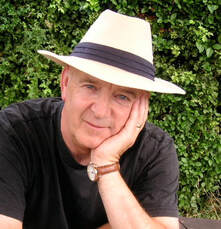|
Short Fiction ~ Rayna Haralambieva First Prize, Strands International Flash Fiction Competition - 12 Shriek, clack, shriek. I look out of the window. I strain my eyes, push my gaze far out into the last slithers of the dying light. Silly bird, you scared me. I wave my arms at it, a scarecrow of no use. Shoo. The crow quietens but doesn’t move. We stay like this, looking at one another, still, undecided. I go back to bed, hold the album in my lap. Cradle it, smell it. When Ronnie was two, he was vicious with pictures. He would rip them and make an airplane, a frisbee, a ball. He would shove the paper ball in his mouth. Spit it into pieces. No, baby, why did you do that? He would throw a tantrum as if it were me who had broken something precious. I would hush his crying and cradle the remains of his baby pictures. I look at the pieces. Little finger, elbow, ankle. I am missing a piece of his T shirt near the collarbone. I try again. I re-arrange the pieces, move them around again and again, not quite. The lower part of his arm hangs in the wrong place and the patches of his T shirt don’t match. Tap-tap, caw. Not you again. I slip into the kitchen. I shovel a handful of muesli, throw it out of the window. Go, now, bird, and don’t come back. Crows recognise and remember human faces. Once you make an impression on a crow, it can remember your face for as long as six years. Ten minutes later. Clack-clack, beak on the glass. This time, much closer to where I am sitting on the bed crunched over the pieces. Its beady eyes fixed on the picture I am not giving up on rebuilding. Shoo. What are you looking at? Crows have better eyesight than humans. We can only see light as a combination of three primary colours, while crows’ eyes perceive combinations of four colours. I remember when Ronnie teared it into pieces. He was crying his eyes gummy, fat snots falling off his nostrils, barely able to catch his breath. No, Ronnie, you’re a big boy now, I said and didn’t go to him, didn’t take him into my arms. Tired of being awake all night, tired of Richard having slammed the door, tired of the world spinning with me falling behind. No, Ronnie, now, be a big boy for goodness sake. Leave mummy alone for a minute, will you. I said and closed the door shut. The lights, the wee-woo, wee-woo piercing my ears, the boots thumping up the stairs. Ronnie’s face blue and glassy and still. They forced the paper ball out of his clenched mouth. One, two, three, again. I heard but couldn’t process. Crows are natural empaths. They genuinely feel for others and want to help. It’s been a month now since I first saw her. Sheila, I called her. Sheila keeps me company on days like this. When the sky presses low and I hold on to pieces of pictures that still hold his milky breath. This one now. He’s grinning in a sway. His tiny hands curled around the ropes to hold himself tight. A toothless smile, cheeks big like grapefruits. I can’t decide where the red patch goes – is it part of his hoodie or his jumper? I show it to Sheila and wait for her to decide. She looks at it and caws. I wait some more. She can do it. She’s done it before. Crows like the process of having something to accomplish and gain a sense of achievement at solving things. But Sheila keeps staring at them and makes strange cries. She looks at me. I look away. What’s the matter, Sheila? Caw-caw-caw fills up the room. She stares at the pieces of my Ronnie. I bring some seeds. She wants none. Now, the cawing has turned into a cackle. Her eyes pierce through something I’ve been holding down for a while. The cackle is hurting my ears and I can’t look at her looking at him no more. She flaps her wings as if warning she’d leave. The cackle goes through the house. Shakes floor, bedframe, guts. Crows hold funerals for the dead. When a crow dies, others gather around the remains to honour the dead. ~  Rayna loves stories for their power to heal and charm. Her fiction is published or forthcoming in, among others, Reflex Fiction, Litro, Flash Frontier and Bath Flash Fiction. She aspires to have an entourage of writerly cats.
2 Comments
Short Fiction ~ Rose Morris Second Prize, Strands International Flash Fiction Competition - 12 It happened thirty years ago. They were young. They were giddy with love and sunshine. She closes her eyes and she’s back there: Portugal, 1991. Hitching a lift. Through a break in the hedgerow, the blue-purple swell of the Atlantic. She sharp-nudges him awake. Let’s jump out here, she says. She’s twenty-two, and impetuous. But, aren’t we … shouldn’t we …? His drowsy brow is furrowing, his eyes quizzical, because this lift is heaven-sent: it’s going all the way from Sagres to Lisbon. Please, she says. He shakes his head and leans forward to get the attention of the driver. What are you like? he says, laughing, as the car pulls away. They shoulder their rucksacks, and walk past a clump of houses and a closed shop. Before long, they reach a gated track. The scramble down is steep and hot, but the deserted beach is long and beautiful. Paradise, she says. He laughs. I thought we’d be drinking rum in Lisbon tonight, but I guess this’ll do instead. She kisses his freckled nose. Later, she emerges from a heat-lulled doze to find the light changed and a breeze goose-pimpling her arms. She scrambles up, muzzy with sleep, rubs her eyes and scans the empty beach. Alarm traces a bony finger along her spine. She runs to the water’s edge, her eyes darting back and forth across the swell. Thank God, she says, thinking she sees him, raising her hand to wave. Not him. A cormorant, bobbing on the swell. She swallows her panic down into her guts. He’ll be at the tent, she says. She’ll find him pulling on jeans and sweater, chilled from his long swim, and he’ll tease her for panicking. She careers across the beach, scrambles over the dunes, and picks her way across scrubland to their camping spot. The tent is empty. She hurtles back across the dunes, shouting his name over and over. If you’re hiding, come out now, she hollers. But he wouldn’t do that. He wouldn’t frighten her. Sometimes she wishes he’d treat her badly, just once. She imagines wild drama, and a passionate making-up. But he’s been gentle and considerate every day of their six years together. And he always lets her get her own way. But maybe today is different. Maybe he’s getting back at her for sabotaging their lift to Lisbon. That’s it! He’s tucked in the dunes watching her. Five minutes from now, she’ll be raging at him and he’ll be shame-faced and remorseful, promising never to scare her again. It’s not funny, she calls, projecting her voice first one way, and then another. I mean it, she cries. I’m really scared now. Please, Davie. Please. She wheels around and around, her eyes frantic searchlights sweeping across the beach and the dunes and the distant headland. And then back out to sea. She rushes back to the shoreline and stares impotently into the waves. Suddenly vicious, they heave and crash at her feet as she yells his name, over and over, the dense salt air stinging her throat. Chrissie, she chastises, for God’s sake get a grip. She shakes her head hard, her hair flying across her line of vision. There’s another explanation. There is. There has to be. Hanging tight to the fraying hope that he’s tricking her, she races back over the dunes to their camping spot, hurtling again into the empty tent, starting up the steep track, changing her mind, running back to the beach, dashing first one way, then the other, eyes everywhere, calling and calling him. Her breath is ragged, her legs buckling, her concentration skittering, unable to settle, unable to think. She bends double, hands on her knees, head down, trying to slow her breath, struggling to find a foothold in her mind. Okay, she decides, this is what’s happened: he thought he’d just meander along the beach while she slept, didn’t intend to disappear from view, but something distracted him, fossils perhaps, so he strayed further, way off beyond those distant rocks, rooting in the sand, losing track of time. He’ll reappear any minute, and she’ll laugh at herself, at all her wild panic. She walks slowly back to their towels and sits down. She’ll stay calm. She’ll wait. She’ll try to read for a while. Half an hour later, she scrambles to her feet for perhaps the twentieth time. This time, the truth, refusing to be kept any longer at bay, looms over her, its hands reaching for her throat. By the time she reaches the road, her knees are buckling, her breath spent. She bangs on the first door she reaches, crying out her panic. A man opens it, startled, calling behind him for someone else to come. A woman appears. A child is sent to fetch a neighbour, a young man who questions her in broken English, searching for shape in her incoherence. As she tries to steady herself, ragworms of hope gnaw through her livid mind. Perhaps he decided to walk back up to the little shop, and surprise her with wine and food for dinner. Perhaps someone invited him in and he’s playing cards in a small back room. Or perhaps sunstroke invaded his tender mind, and he grabbed his passport and left her while she slept. He’s left a note in the sleeping bag. He’s hitching alone to Lisbon. Can blistering sunshine affect the brain like that? The young man is waiting for her to articulate her distress. She suddenly sees herself through his perplexed gaze: a straggle-haired young woman, wearing only a bikini and flip-flops, half-deranged. My boyfriend went swimming, she says. He hasn’t come back. Where she lives now, no-one knows that he existed; that three decades ago, she sacrificed her lover to the malevolent ocean. She, his tragedy. She looks out to sea. Lapping at her feet, the moonlit tide. Carried on the swell, his ghostly voice. When the water is waist-high, she hesitates, looking skywards. A gull cries out, above her. ~  Rose Morris lives in County Cork, Ireland. For decades, she stymied her urge to write. But longing will have its day and in 2019, Rose finally threw off her shackles, becoming a founder member of the Irish Writers Ink group, and beginning to write regularly, openly and in earnest. Her first novel, There Will Be Tempest, will shortly be sent out into the universe to look for a home. Rose has recently turned to short fiction, since when she has been placed or listed by Fish Flash Fiction 2021, Strands International, Lunate 500, and Bray Literary Festival. Her biographical writing has been published in two editions of Childlike. Rose has a passion for books (of course!), wildlife, the sea, old friends, new ideas, fresh air, bright colours and hot chocolate. Short Fiction ~ Emma Venables Third Prize, Strands International Flash Fiction Competition - 12 The pram protests the potholes on Budapester Strasse I throw all my weight against it and almost laugh – I’ve lost so much of myself these past few months that my force is meagre. I hear myself groan with the effort, expending energy I can’t afford to lose, but the pram chunters forwards and I manage to save myself from meeting the mud, the sand, the fragments of lives long lost. I straighten my spine, listen to its crick and crack. Almost gasp with the relief. I let go of the pram for a moment, push my hands to my head and try to dispel the thoughts, the acknowledgement of all kinds of hurt, with pressure on my temples, my cheeks, my jaw. Something my mother used to do, to herself and me, when motherhood and childhood got too much for us both. A man walks towards me. I try to make myself compact – chin down, eyes down, shoulders hunched forwards – as if I can somehow infantilise myself at will: become a child pushing a dolls’ pram, rather than the grown woman I am. I sidestep as he gets closer. My ankles wobble against the earth’s camber. I hear the thrum of my pulse. He does not reach for me, does not drag me to the darkest places amidst the rubble and tear at my clothes. I turn and watch him until the debris conceals all but the top of his head, and then I take the pram’s handlebar and continue on my way. Now isn’t the time to wonder how I’m going to make it home, but I find myself drawing the journey in my mind, illustrating it with Berlin’s jagged edges – the broken arm of the standpipe on Pariser Strasse, the body of the National Socialist hanging from the lamppost on Augsburger Strasse, the gaping shop fronts on the Kufürstendamm that look like mouths with fangs ready to sink into looting flesh – us Berliners continue to rummage, continue to hope, despite knowing there’s nothing left. I inhale, feel the city’s dust-laden air clog up my lungs and cough it out. Would the journey be easier, more worthwhile, if I had someone waiting for me in the lopsided apartment with the cracked windowpanes? If I were to open the door to my mother’s cool hands upon my forehead, her relief that I made it home in one piece, with the twigs I’ve managed to pilfer from the Tiergarten? If Walter were to enter the hallway moments after me and wrap his arms around my waist, rest his chin on my parting and ignore the tickle of lice, the scent of unwashed hair? These ghosts, voices, questions mingle with the pram’s rattle in my mind. Tinnitus for the defeated. I lift my face to the sky. Rain has begun to fall. Patches of moisture form on my shoulders. My hair clumps about my ears. I rub my breasts, frown to stop myself from sobbing at the damp patches on my dress. I’m not sure if they’re from the rain or from expectation unmet. I want to bash my chest for not being enough for her, for its insistence on continuing to try several days after I laid her beneath the broken cobblestones in the courtyard. Makeshift grave. Makeshift crucifix. Makeshift prayers. I push the pram around the corner. My knuckles blanch with the effort of keeping it upright. I notice a woman walking on the other side of the street. My heart slumps in my chest. I want to avoid the women as much as I want to avoid the men. She smiles at me, raises her hand in a half-wave. I squint in an effort to unblur her edges, try to find some familiarity in her threadbare coat, laddered tights, the toes that peep through her shoes. She must be about sixty, but then again, we all look older than our years nowadays. The woman walks towards me, ankles skirting the rubble. I wince as she misses a piece of cracked guttering by a hair’s breadth. She doesn’t notice her surroundings. Her eyes are fixed on me. I know what’s coming and I don’t know if I can bear it once more. I’d spin around, pram and all, and walk in the opposite direction if I could, but I don’t have the energy, the coordination, the navigation skills to get home through streets I once knew by heart but now I can no longer differentiate between one bombed-out block and the next. And so, I wait. I wait for bony fingers on the pram’s hood. I wait for the sag of the pram against the woman’s weight. I wait for the woman’s features to draw into the expression older women seem to have when bending to greet the next generation. I wait for her to step back, hands to her cheeks. I wait for her to put her hand on my arm, shake her head. I wait for her to give me her only handkerchief to help soak up the milky mess blooming on my dress. I wait for her to walk away, the fingers on one hand poised as if still clutching the pram’s hood and her head bowed, mourning the silence, the presence of wooden limbs where chubby flesh should rest. I wait like a woman in line for the guillotine as the other woman walks past; she keeps her eyes on the ground and her hands in her frayed pockets. I watch her until she disappears from view and feel the loneliness that comes from loss and avoidance. Could I call her back? Beg her to look at, to acknowledge, the branches gathered where my daughter should be with her fists jammed into her mouth and her belly convex with nourishment? I shake my head. I would laugh at myself if I had the energy. I lean my weight against the pram, force it forwards in the direction of home. ~  Emma Venables' short and flash fiction has been published in magazines and journals such as Mslexia, Lunate, and The Cabinet of Heed. Her short story, ‘Woman at Gunpoint, 1945’ was a runner-up in the Alpine Fellowship Writing Prize 2020. She has a PhD in Creative Writing and has taught at Royal Holloway, University of London and Liverpool Hope University. She can be found on Twitter: @EmmaMVenables. Short Fiction ~ Oscar Windsor-Smith Third Prize, Strands International Flash Fiction Competition - 12 These lucid dreams come to Max Lowman in the chill stillness of never-ending dusk. Around him muffled whispers merge with the chirrup of birdsong and the slow rhythmic sigh of some sleeping beast. Something shimmers in the margins of his unfocussed sight, invading his mind and what now passes for his life. The spectral being inclines what might be its head as if considering Max’s unvoiced question. It nods; a leisurely movement, it has all the time in the universe. ‘Think of me as agent,’ it purrs, ‘I serve clients with interest in the health of humankind. Please note I did not say the good health.’ It must be reading his mind. ‘How unfair. Now you imagine me as monster when I am only an honest broker engaging whatever resources come to hand. Your personal contributions are appreciated by the way.’ Max is sure he has made no such contribution. No. No, he had no part in this. ‘Ah, yes. Outraged denial is a common reaction. Come, let us visit some of your inputs to our cause.’ In a sparsely occupied up-town office, Max reclines in his upholstered executive chair. A microphone headset sits askew on his close-cropped hair; his fingers dance over a game console. His dilated pupils flick restless between three monitors on his desk and through a clear safety screen at the thighs of a shapely colleague. Blushing, she wriggles, tugging-down the hem of her skirt. Max chuckles. ‘Dream on, Lexi.’ Glaring over her mask, Lexi O’Connor flicks Max the finger. ‘When you’ve lived in a golden age of health, wealth and instant gratification, it must be hard to accept your world is ending.’ Max snatches off the headset. He slings it down and leaps to his feet. Now he’s right beside her, pushing his face into hers. Spittle flecks his lips. ‘That’s bullshit.’ Lexi starts, rolls back her chair, putting distance between them. ‘Get away from me!’ she hollers pulling a Kleenex from her sleeve and wiping her face; eyes alight with loathing. ‘And wear a mask you disgusting bastard.’ ‘Wear a mask,’ Max parrots, ‘Like you and all the other mugs?’ Sidling back to his desk, Max glowers. ‘You believe in this hoax?’ Flopping back in his chair he rams the headset back on, glancing at the red columns and downslope graphs on his financial monitors. ‘It’s just a blip in the markets. I’ll better my sales quotas once the panic’s over.’ Max snatches up his game console and turns to another monitor. ‘Anyways, if so many people are dying, where are all the bodies?’ He’s shouting now, ‘Show me the bodies.’ Lexi is heading for the female rest room. She whips around. ‘You stupid juvenile prick, Max. Do you honestly think this pandemic is like Assassin’s Creed? People aren’t dying in explosions or hails of bullets. They’re expiring alone in ITUs, drowning in their own fluids, choking for breath.’ Max isn’t listening. He’s on a ZOOM call with a bunch of buddies. ‘Okay, guys, party’s at my place tonight. Last one in pays for the entertainment.’ Max Lowman’s mortal form lies amid dozens of other wrecked lives. Most, like him, are moribund and bed-bound whilst others toil, selfless and exhausted, in scrubs and PPE, vainly trying to save them. The agent drifts above the inert body, into whose glassy lungs a ventilator strives to pump oxygen. ‘You were correct, my friend,’ the words echo in Lowman’s fading dreams, ‘there are monsters at large in your world; their names are Greed, Ignorance and Narcissism.’ Gliding over row upon row of beds the agent surveys each sad intubated body. It reads the name above each and stops briefly at one recording Lexi O’Connor before returning to its protégé. ‘Just think, Max,’ it sighs, ‘you achieved all this single-handed. Can you imagine what thousands like you will accomplish?’ A final shudder of denial heaves through Lowman’s corpse. The agent gazes down. ‘You gave exceptional service, Max Lowman,’ it whispers. ‘Sleep well.’ ~  Oscar Windsor-Smith is an English writer from Merseyside, now resident in south Hertfordshire, UK, with fiction and non-fiction prose and a smattering of poetry published in diverse places, in print and online. His short fiction has appeared in a number of anthologies, most recently in the Departures anthology from Arachne Press. He graduated from the 4-year BA creative writing course at Birkbeck, University of London, in 2018, having specialised in screenwriting, but is returning to his first love, short and flash fiction. Short Fiction ~ Deborah Appleton Honourable Mention, Strands International Flash Fiction Competition - 12 They told me he wasn't coming home now. They would move him on to that nursing home, get him stronger after the stroke. They kept nodding at me, it was all agreed, probably a month, maybe two, keep him under observation. Would I be all right at home, they wondered? I didn't say anything, I didn’t dare say anything. They brought me back. They were worried. It’s ok, I told them. I’ve managed here for over sixty years. Well, that stopped them. They looked me up and down. They took me in with their eyes. I know what I am. I’m as strong as an ox that’s what I am. Good farm stock, never had a day in bed. We both came from that. My people were wheat farmers from Canada. Walter’s from the Nebraska, cattle people. By the time I told them that, I knew who was stronger. But when they left I couldn’t stop shaking. The house was so quiet and I couldn’t stop shaking. I just stayed by the door there until a sound rose up out of me, an ocean sound, a wave coming in, it was glorious. I stayed by the door for a long time. I watched the light shift and shadows lower across our living room, my living room. Everything was so peaceful, so tender. And then I got up. I went to the bathroom and washed my face. I put on some of that perfume my daughter Sharon gave me years ago, smells like lilies of the valley, still in the same box and everything. There would be Sharon to call, tomorrow, no rush. I filled the room with the fragrance, just standing there in the bedroom. I put on the blue blouse with the small forget-me-knots at the collar. I always keep that one nice and tidy, the colour is good on me. I went into the kitchen and made a large glass of ice tea. I put in a big slice of lemon and stirred it up. Then I went out to the back porch, to Walter’s chair. I took my cushion from my chair and put it on Walter’s chair. I adjusted the chair so that I got the sunset on my face. I love that, when the heat of the day is gone. Walter’s chair is a big, roomy old wicker chair, still sturdy, comfortable. I have those sunglasses that protect my eyes from the sunspots. I breathe in the lily of the valley. Walter hates perfume. Walter hated perfume. Walter is never coming home. I know that. They know that, but they are speaking to an old lady who has lived with her husband for over sixty years. They don't know what I am, they don’t know how I have lived. The young are so sentimental. “How many years have you been together?” They ask. “HOW many?” It means everything to them. They never ask anything else. And I would never say. I would never tell them how I learned to duck my head at certain times after dinner, learned to be busy in the kitchen on rainy weekends. Never left anything lying around on a countertop or a tabletop, any object that could be used. A person gets tired with all that planning. A person makes mistakes, forgets and then a person gets tripped up. It comes out of nowhere, it always comes out of nowhere. Oh, you hear about us women. They are on talk shows, there are articles in the newspapers, in the glossy magazines. Almost everyday you hear something. I would stop to read, stop to listen. But you don’t hear about the ones who stay. Sixty years, and they all smile. Don’t they see the bruises on my arms and the back of my legs? Some of us can’t go, cant leave. I don't know why. I used to ask myself when would it be too much, until I got fed up asking myself. He got older, I moved quicker. In a dark room, I could put a chair in a different place. I could make things difficult. It got easier. And now he’s not coming back. I shift my ice in my long, tall drink. I know what I am. I am an eighty three year old woman. I am as strong as an ox. I breathe in the lilies of the valley. Sixty years and I have been waiting. Does that make it better? I put my face into the strong heat of that setting sun. ~  Deborah Appleton worked for Cosmopolitan Magazine in NYC before moving to Nairobi Kenya to write travel books. She then worked on the west coast of Scotland. She currently spends most of her time in the mountains of Switzerland and is editing her first novel and finishing a second. Short Fiction ~ Lindy Newns Honourable Mention, Strands International Flash Fiction Competition - 12 Alyssia sets her phone to wake her up half an hour earlier than usual even though she’s exhausted and could have slept all morning given the chance. The car is covered in frost and it takes ages to scrape off, her engine running and the fan on. The roads are icy, snow in mounds along the kerb and her fingers are stiff on the wheel, but she gets there and at least the wards are warm. Masked and scrubbed for another shift, she is hot after an hour. Everywhere, alien eyes and no chance of knowing what these strangers are thinking, even though they are not strangers and are probably as exhausted as her and, like her, trying not to think too hard. If you start thinking about human beings and human grief, then you are done for. No. Tick the boxes, turn the sheeted shape, make a note of the oxygen levels, repeat. Hour after hour for a ten- hour shift. Longer, because you have to hand over and that takes time and the paperwork has to be clear with no chance of being misread by another exhausted doctor or nurse. And it is finally over. Alyssia removes her plastic visor, her surgical mask, the plastic gloves, and stares at herself in the mirror where she sees a woman she hardly recognizes. There are dark circles under her eyes, blotched cheeks and angry red marks where the plastic straps have dug in. They have warned her about the protest going on outside, so she leaves by a side entrance. She has to wait to open the door because her heart has suddenly started to race; she can hardly breathe but she makes it to the car where she bends over and waits for the ringing in her ears to stop. A headache screws itself into her skull and she worries about her blood pressure. She is overweight, she knows it, and at more risk than most from the virus, but this is her job. She is saving lives every day and has no choice but to carry on. She is just so exhausted. Nevertheless, she has to get home. She can’t sleep in the car. There is another blizzard on the way. She drives slowly round the vast hospital complex. It’s supposed to be one- way traffic but sometimes there are drivers coming the wrong way, lost, and unable to turn back in the narrow road, so she takes it easy, using the time to practise some breathing exercises, get her heartrate under control. Before she reaches the highway, she sees the protestors. They must have moved away from the main entrance. They block the road, wearing their heavy winter coats and hats against the cold, but no masks of course. Either they do not think they can catch it, or they believe that wearing one infringes their civil liberties in some way. They wave banners at her car. Set us free. Covid is a lie. Alyssia suddenly wants to slam her foot down, ram into that crowd and hear thuds as the car hits; she wants to see bodies fall under the wheels, wants to feel the jolt as the tyres crush flesh and bone. Her right foot twitches. She is just so damn tired. She sighs. If she injures anyone, they will be taken to A&E and that is already full, ambulances lined up outside. She leans her head on the wheel, closes her eyes. After forty long minutes, the crowd finally moves to let her through and she hits the highway just as the first white clumps of snow start to fall. ~ Based in Manchester, UK, Lindy's nature is curious and hopeful which helps with her day job supporting young unaccompanied migrants with English and emotional and mental issues. She has been shortlisted for several drama awards, but this is the first time ever shortlisted for flash, although she has had one piece published in Popshot magazine in the UK.
Honourable Mention, Strands International Flash Fiction Competition - 12 Lost again. Rita had walked the back alleys of the souk every morning and, every morning, she’d got lost. She found herself engrossed, wandering along, soaking in the rainbows, drowning in the spicy air. By the time she lifted her head, she was lost. This morning was hot. Just like all the others had been. Dry heat, though. Not like the insufferable, suffocating humid heat at home. This was bearable. Home wasn’t. She was sure that she’d passed this particular spice stall a hundred times already, its vast brightly coloured sacks of ground cinnamon, cardamom pods, ginger roots, neatly lined up. An army of spices. What she hadn’t noticed before was the stall next door. One man sat, bent over a rug. There were hundreds of rug stalls here, thousands if you counted them across the whole of the city but this one drew her eye. Maybe because the guy was taking no notice of people passing. He wasn’t trying to entice people in. He didn’t look like he was up for a morning of haggling. He was just getting on with his work. Rita moved in closer. “Sit.” The man didn’t look at her. She sat on a leather stool. She watched as his hands moved swiftly backwards and forwards across the rug. He was sewing a rug right in front of her. Rita had never thought how rugs were actually made. There was so much she hadn’t thought about. The man held his needle and thread up to the light. “Golden yellow. The colour that his hair would have been. The colour of the joy he would have brought you.” Rita’s mouth filled with acid. The man continued to sew. He took out another length of thread and held it high above his head. “Sapphire blue. The colour his eyes would have been. The colour of the fear you would have felt for him.” Rita’s breath grew shorter and shallower. The man drew out a length of deep red thread and held it up. Rita stood. “Sit.” Still the man didn’t look at Rita. His only focus was the rug. “Crimson red. The colour his blood was for a few short months. The colour of the anger that leaked from you.” The man’s hands flew across the material. Rita began to cry. A gentle, silent stream of salt. The man reached for more thread. He held a length of darkest grey out towards Rita. “Deep metal grey. The colour of your husband’s heart. The colour of the sadness which he, too, feels.” The man looked at Rita for the first time. “Grey is the colour which binds you together.” He took the thread and snapped it, all the while looking into Rita’s eyes. “Take this.” He rolled the rug and handed it to Rita. Now she realised that this had all been a ploy. “How much?” “Take it. It belongs to you.” She wondered whether the man hadn’t understood her. She took out her purse. “Money?” “No. Please take it.” Rita left the stall with the rug under her arm. That night in the hotel, cradling the rug, she slept solidly for the first time in months. She woke with the dawn, the sun touching her face. She reached across the vast bed and felt the empty space next to her. It was time to go home. ~  R. J. Kinnarney is trying to make sense of their tiny corner of the world, through tiny pieces of writing and lots of reading. Currently working on a novel, which looks at attitudes to war, communication, prejudice and what strength means. Work can be found at 100 Words of Solitude, Funny Pearls, Southam Book Fest, 101 Words, Daunt Books, Café Lit, Dwelling Literary, Sledgehammer and Pure Slush; soon to be at The Hungry Ghost, Free Flash Fiction. Links to online and print published works can be found at rjkinnarney.com Twitter: @rjkinnarney |
StrandsFiction~Poetry~Translations~Reviews~Interviews~Visual Arts Archives
April 2024
Categories |
 RSS Feed
RSS Feed